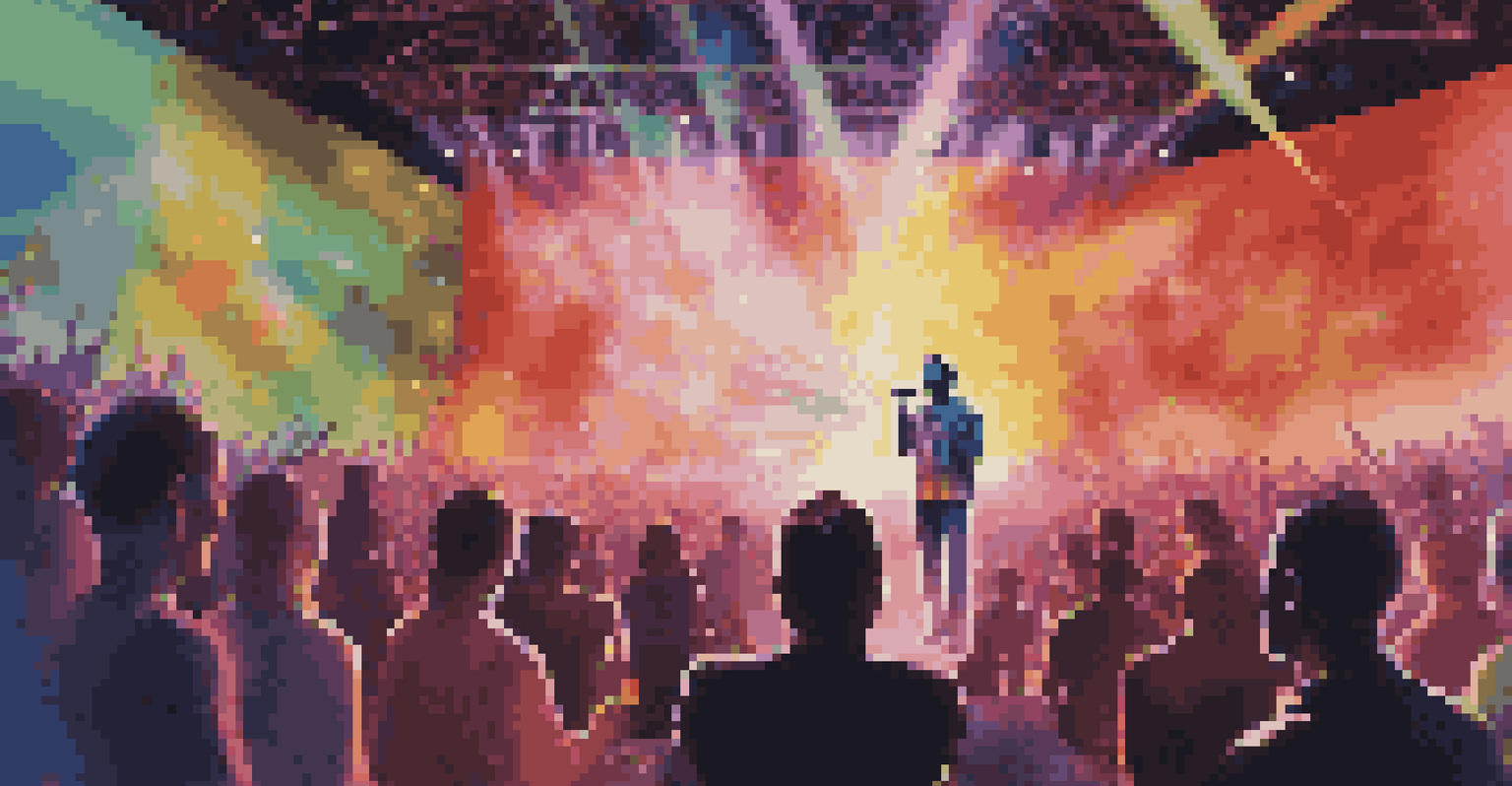Exploring AI's Role in Music Festivals and Live Performances

How AI is Revolutionizing Live Music Experiences
Artificial Intelligence (AI) is changing the way we experience live music. From personalized playlists to real-time sound enhancements, AI is making concerts more engaging. Imagine walking into a festival and hearing music tailored specifically to your taste, all thanks to smart algorithms analyzing your preferences.
The future of music is not just in the notes played, but in the experiences created around them.
Moreover, AI can optimize sound quality during performances by adjusting levels dynamically, ensuring that every note resonates perfectly. This technology allows artists to focus on their performance while AI handles the technical aspects. Such innovations not only enhance the audience's experience but also elevate the artistry of musicians.
As we look forward, the integration of AI into live music events promises even more exciting developments. Whether it's through virtual reality experiences or innovative light shows, the possibilities are endless. This technology is not just a trend; it’s a game-changer for the music industry.
AI-Driven Personalization for Festival Attendees
One of the most exciting aspects of AI in music festivals is its ability to create a personalized experience for attendees. With data analytics, festival organizers can understand audience preferences and curate lineups that resonate with the crowd. This ensures that fans see artists they love, enhancing overall satisfaction.

Additionally, AI can facilitate personalized schedules for attendees, suggesting which acts to see based on their musical tastes. Imagine receiving a notification about a surprise set from your favorite artist just as you're walking by their stage. This level of personalization creates a more engaging festival atmosphere and fosters a deeper connection between fans and performers.
AI Personalizes Live Music Experiences
AI enhances live music by tailoring playlists and schedules to individual attendees, creating a more engaging atmosphere.
Ultimately, the aim of AI-driven personalization is to enhance enjoyment and make each attendee feel valued. By leveraging technology, music festivals can transform into immersive experiences that cater to individual preferences, creating lasting memories for all.
Enhancing Performance with AI-Powered Tools
Musicians are increasingly using AI tools to enhance their performances. For instance, AI software can assist in composing new music or generating unique beats that artists can incorporate into their sets. This creative collaboration allows musicians to explore new soundscapes they might not have considered otherwise.
Technology is best when it brings people together and creates new forms of expression.
Additionally, AI can analyze live performances to provide feedback on areas for improvement. This can range from vocal pitch correction to suggesting changes in tempo or arrangement. Such insights can help artists refine their craft and deliver better performances, ultimately benefiting the audience.
As AI technology continues to evolve, musicians will have access to even more sophisticated tools. These innovations are not just about making music; they are about redefining the artist's role and expanding the boundaries of creativity in live performances.
AI's Role in Visuals and Stage Design
AI isn't just revolutionizing sound; it’s also transforming visuals at music festivals. With AI-driven projection mapping and light shows, performances can become a feast for the eyes. Imagine a dynamic visual experience that syncs perfectly with the music, immersing the audience in a multi-sensory experience.
Using machine learning algorithms, visual artists can create stunning graphics that adapt in real-time to the music. This means that no two performances are exactly alike, making each show a unique experience. The synergy between music and visuals creates a powerful atmosphere that captivates the audience.
AI Enhances Performance Quality
Musicians utilize AI tools for composing, real-time feedback, and refining their performances, ultimately benefiting the audience.
As technology advances, we can expect even more innovative uses of AI in stage design. This not only enhances the aesthetic appeal of performances but also elevates the overall experience, making concerts more memorable.
AI and Crowd Management at Festivals
Effective crowd management is crucial for the safety and enjoyment of festival-goers, and AI plays a significant role in this area. By analyzing real-time data from social media and ticket sales, organizers can predict crowd sizes and adjust staffing accordingly. This proactive approach helps in preventing overcrowding and ensuring a smooth flow of people.
Additionally, AI can enhance security measures by using facial recognition technology to identify potential threats. While this raises some privacy questions, the primary goal is to create a safe environment for all attendees. With AI monitoring the crowd, security personnel can respond quickly to any incidents that arise.
Ultimately, AI's role in crowd management enhances not just safety, but also the overall experience of festival attendees. By addressing potential issues before they escalate, organizers can focus on delivering an unforgettable event.
The Future of AI in Music Festivals
As we look ahead, the future of AI in music festivals is bright and full of potential. We can expect even more sophisticated tools and technologies that further integrate AI into live music experiences. From virtual reality concerts to interactive apps, the possibilities are endless.
Moreover, as AI technology becomes more accessible, we may see a rise in independent artists utilizing these tools to enhance their performances. This democratization of technology could lead to a new wave of creativity, allowing all musicians, regardless of their resources, to innovate and engage their audiences.
AI Improves Crowd Management Safety
By analyzing data and utilizing facial recognition, AI helps organizers manage crowds effectively, ensuring attendee safety at festivals.
In essence, the future of music festivals will likely be shaped by the continuous evolution of AI. As artists, organizers, and fans embrace this technology, we can anticipate a new era of live music experiences that are more engaging, personalized, and memorable.
Challenges and Considerations in AI Integration
While the benefits of AI in music festivals are numerous, there are also challenges to consider. One major concern is the potential loss of the human touch in performances. As we rely more on technology, there’s a risk that the emotional connection between artists and audiences may diminish.
Additionally, privacy and data security issues must be addressed as festivals collect more personal information to enhance experiences. Striking a balance between personalization and privacy is essential to maintain trust with attendees. Organizers must ensure that data collection practices are transparent and respectful.

Finally, the implementation of AI technology requires investment and training. Not all artists or organizers have the resources to adopt these tools, which could create disparities in the industry. Addressing these challenges will be key to ensuring that AI enhances rather than detracts from the live music experience.